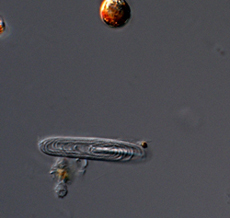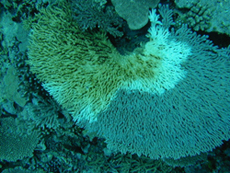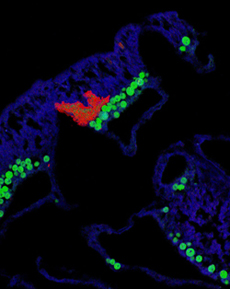Marine microbes encompass all microscopic organisms found in the sea, including groups varying widely in their biological characteristics and many who play important but poorly understood roles in the marine environment.
With new molecular techniques, scientists are discovering the huge diversity of marine microorganisms and a wide range of previously unknown microbial functions.
Microorganisms fall into five major categories:
- viruses
- bacteria
- archaea (an ancient group of simple, single-celled microorganisms)
- protists (single-celled organisms, including the algae that live symbiotically with corals)
- microalgae (microscopic single-celled algae).
With a litre of seawater holding more than a billion microbes, estimates of global microbe abundance are so big they can only comfortably be written using mathematical notation: 3.6 × 1029 bacterial cells; 1.3 × 1028 archaeal cells; and 4 × 1030 viruses.
Estimates of marine bacterial diversity range from a few thousand species to as many as two million distinct kinds. Limitations of traditional cultivation technology (generally only 0.1–1 per cent of marine microbes can be recovered on standard culture media by conventional methods) mean that the diversity, phylogeny and function of marine microbes have remained largely unexplored.
Importantly, we know little about the implications of changes in microbe biodiversity and biomass, both in the water column and on the seafloor.
Global environmental change will greatly affect the Great Barrier Reef. The primary influences will be an increase in global sea surface temperatures by several degrees Celsius along with sea level rises, as predicted by Intergovernmental Panel on Climate Change models.
Other associated effects include increased seawater acidity and terrestrial inputs. The effects of climate change could have a significant impact on marine microbes, potentially altering microbial diversity, function and community dynamics.
Although microbes constitute by far the largest diversity and biomass of all marine organisms, they are often ignored in discussions about the impacts of climate change. This is despite the likelihood that microbial life on our planet will play a central role in either accentuating or mitigating the effects of climate change.
Microbes are critical to the global biochemical cycles (including carbon, nitrogen and trace gases), so changes to temperature, nutrient availability and environmental pH will have major impacts on microbial processes.
The Centre for Marine Microbiology and Genetics Research hosts research to evaluate the risk to marine organisms and communities posed by climatic change and environmental contamination.
Specific goals are to:
- examine the molecular response of nearshore organisms to terrestrial pollution
- analyse the response of corals and microbial communities associated with corals and sponges to global warming and nutrient and pollution stress to better understand anthropogenic impacts on coral reefs
- analyse the gene response of corals to the pathogens of coral disease
- develop genetic diagnostics for the identification of thermally resistant coral populations.
High-throughput nucleotide sequencing platforms make it possible to sequence every gene within a complex community and reconstruct genomes to identify what is there and what are their potential functional roles.
With metagenomic and metatranscriptomic approaches we can investigate the diversity and functional capacity of the unseen microbial world. This provides answers to key questions surrounding the beneficial role that microbes play in corals and sponges, while also identifying how infections and disease develop, and how pathogenic microbes respond to changing environmental conditions.
These approaches are also being used to find early indicators of stress within coral reef animals, as changes in their associated microbes are often signs of disease long before it becomes visible.
Such early indicators of environmental stress feed into reef management strategies with a rapid response to mitigate and reduce impacts on marine environments.




